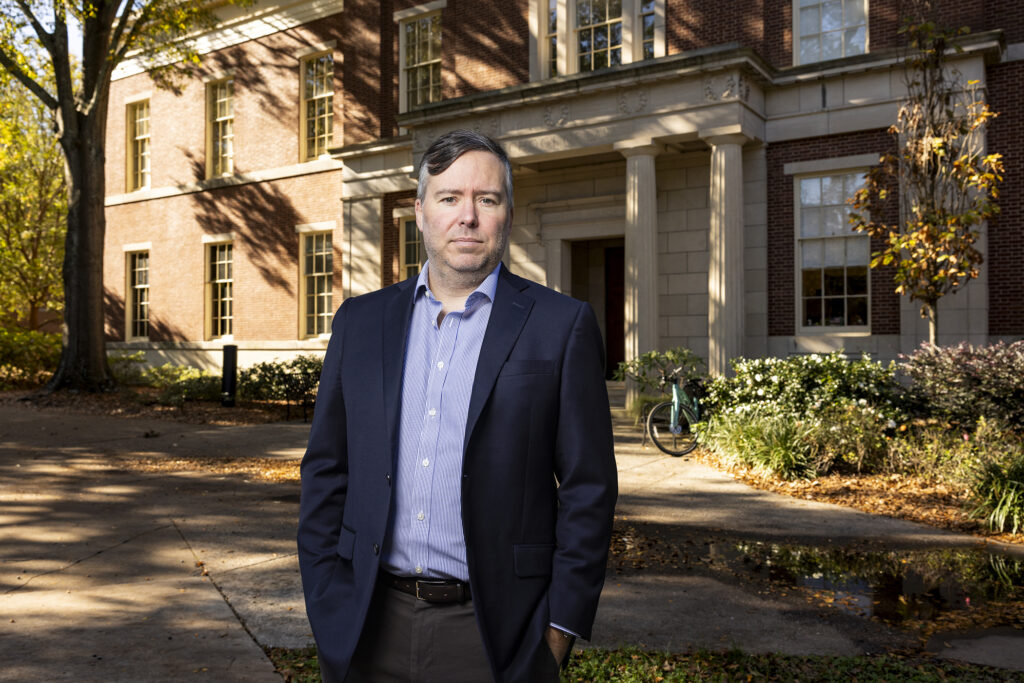Nathan S. Chapman has established himself as a world-class scholar on the intersection of law and religion.
“There are hundreds and thousands of different faith communities represented in the United States,” Chapman said. “How should a society that is that religiously diverse try to address that diversity, especially when it raises conflicts between law and private action and, sometimes, gives rise to political controversies?”
In addition to studying how the law interacts with religion, including the very specific requirements of the Establishment Clause of the First Amendment, he also studies the ways in which, surprisingly, the law acts like a religion.
Even when strictly secular in nature, Chapman, who holds the law school’s Cleveland Distinguished Chair of Law, points out that there are elements of law and government that seem to take very specific cues from the symbolism and rites of religion. The concept of civil religion helpfully explores that comparison, he said.
“There are ways in which the U.S. Supreme Court is kind of conceived of as this authority. They wear these black robes, they sit on a bench. There’s tons of ceremony and ritual,” he explained, citing this one specific example.
People confront this notion in everyday life, however, just as they experience commonplace activities.
“American civil religion includes lots of practices and rituals, like ‘The Star-Spangled Banner’ before a baseball game. It’s as simple as that,” he said.
Having studied both law and theology at Duke University, Chapman is especially qualified to meander the often fuzzy line between these two worlds. The most important aspect of managing this dichotomy, he said, is to approach his subject and his students with a fervor for mutual respect.
His most recent scholarship includes co-authoring an Oxford University Press book with one of his mentors, Stanford University law professor Michael W. McConnell, titled “Agreeing to Disagree: How the Establishment Clause Promotes Religious Pluralism and Protects Freedom of Conscience.”
“I think it’s important because we have so much religious diversity,” he said, “and we have so much, I think, misunderstanding about the relationship between the government and religion that the Constitution creates.”
The central problem he describes is the conflict between two extreme opposite misunderstandings.
“[Religion] is not something to be brought into the public square. It shouldn’t influence the way people think about politics or policy,” he said, describing one side of the argument. “On the other side, the idea that government should be an engine of promoting one religion or the truth about religious belief is also an error.”
Instead, Chapman argues, the Establishment Clause exists to provide all Americans with an equal footing despite their flavor of, or lack of, religious beliefs.
The values of respect and dignity also take center stage in his classroom. To that end, he makes sure that his first priority is to listen.
“The students have really interesting stories and experiences, and they’re really bright and interested and engaged in this stuff,” he said. “I think they know whether you’re on their side or not by how you treat them and how you listen to them.”
Chapman also, in his words, pushes students to challenge their own prior biases and ideas in order to examine topics from the other side, no matter what side that may be.
Whatever he is doing, it must be working. He has twice been honored with the C. Ronald Ellington Award for Excellence in Teaching by graduating law school classes, along with numerous other student-nominated honors.
“That [recognition] is really humbling and really gratifying, because I love my students and love teaching. It’s a great delight. It’s a part of my job that I never resent or try to avoid,” he said, with one caveat. “Grading is the worst. Grading is the only part of my job that is terrible.”
In 2025, he will travel to Australia’s University of Queensland for one month to study with professor Nicholas Aroney. Their work will focus on comparing the Establishment Clause in the U.S. Constitution with the correlating clause in Australia’s Constitution, research that Chapman is expanding to look at the global, historical range of such provisions.
Chapman, who originally attended Belmont University with intent to study music and performance, still makes a point of frequently serving in his church where he plays the piano and occasionally sings. He has also performed for the law student body at UGA with fellow musician and School of Law Community Health Law Partnership Clinic Director Jason A. Cade.
He also volunteers at Bigger Vision, an Athens homeless shelter, and spends time with his wife and two teenage sons.
“When I had an opportunity to come to Georgia, it was honestly really easy for my wife and me,” Chapman, who has been a faculty member at UGA since 2013, said. “It was a great fit for us.”
